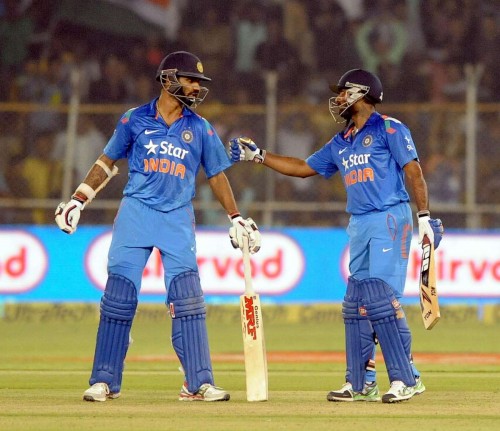
By Veturi Srivatsa
The entire cricket world is waiting with bated breath to see the first bouncer bowled in the India-Australia Test series after a short-pitched delivery fatally felled Phillip Hughes at the Sydney Cricket Ground barely two weeks ago.
Former Australian bowler burly Merv Hughes wants the very first ball of the Test series to be a bouncer. Ricky Ponting endorses it. Not that any fast bowler held himself back elsewhere in the world after Hughes’ untimely death. The bouncer will remain a potent weapon in the bowler’s armoury, come what may, it is in no danger.
Some joined the issue to pre-empt a ban-the-bouncer cry, some others want helmets to be redesigned to protect vulnerable areas of the head and neck. The debate will rage on.
The Indians waited as the Australians mourned the young man’s death. Acting captain, coach and team director were at Macksville to attend the funeral.
The authorities both in Australia and India made sure the tour is not truncated. They tweaked the itinerary to accommodate all the four Tests, the first of which bowls off in Adelaide Tuesday, originally the venue for the second Test.
The Gabba Test will now be the second before the teams move to Melbourne for the Boxing Day Test and finally to Sydney to play the fourth in the New Year.
There has been a talk of inadequate preparation by India for the series. Yes, they played a series of One-dayers against the West Indies and Sri Lanka at home before flying out to Australia.
It is not an ideal preparation for a Test series, but then it is not the Indian board’s fault — the West Indies players decided to pull out of the Test series following a pay dispute with their board.
Does it make sense to play two two-day games before the first Test? They could have played one four-day game or two three-day matches.
Look at the number of Indian batsmen retiring after scoring fifties so that their colleagues also get to bat. There was a time when both the teams used to test their potential Test sides in the warm-up games. Now the hosts throw up their under-19s to give them the feel of a big match. It is like providing practice bowlers at the nets.
If the first Test were to be played as scheduled at Gabba the talking point would have been whether India should play four pacers. Not many pitches in the world presently tempt any team to play four fast bowlers unless the curators leave so much of grass to scare the visiting batsmen.
These days no team wants to take such a huge risk as it can backfire on their own batsmen if they have to bat first.
It is amazing for the Indian think-tank to even consider playing four fast bowlers. It shows their confidence in their new ball operators. There was a time the new-ball bowlers were seen as a shade faster than the spinners and that they are there only to see the shine off the ball for the spinners to come in. The Gabba speculation is put on hold now that the first Test is in Adelaide.
There have been times when India played four spinners and lost Test matches. Then there are occasions when they played three medium-pacers and one spinner overseas and still lost. There were times when they went in with three spinners and one medium-pacer at home, yet could not force a victory.
They have won, too, a couple Tests with these experiments in recent times, thanks to individual performers like Sachin Tendulkar, Rahul Dravid, V.V.S. Laxman and Virender Sehwag with the bat, and Anil Kumble and Harbhajan Singh spinning the ball. These are few and far between.
There have been instances of the pace of Kapil Dev, Javagal Srinath, Zaheer Khan and Ishant Sharma winning matches.
There was that great spell by Ajit Agarkar to win a Test in Adelaide in 2003-04 series when Dravid and Laxman undermined Australia’s first innings score of 556 with a massive 303-run stand.
Dravid, who hit a double century in the first innings, carried the side to victory with an unbeaten 72 in the second after the Australians were bowled out for 196 in their second innings.
In the last 30 years, India have had some memorable series Down Under — only the 1991-92 and 2011-12 series were washouts, with India losing all four Tests. They fought on level terms in 1980-81, 1985-86, 2003-04 and 2007-08 series and India should have won all the three with a little luck and a bit of competent umpiring.
It has become a fashion every time India go on a tour to Australia, South Africa and England to say that this was their best opportunity to win the series — But with a rider that they take 20 wickets and for that the bowlers must have enough runs from the batsmen.
This appears to be a psychological ploy and it is again said the side has the potential. This time around they can afford to play two spinners with three pacers as all the tweakers in the squad are capable batsmen, too.
Apparently, the team management did not want to change the decision to allow Virat Kohli to lead the side in the first Test, even in the changed circumstances and with Mahendra Singh Dhoni joining the squad.
The Australians have welcomed back their captain Michael Clarke, taking his word that he has recovered from his hamstring problem. They have cobbled up a fairly experienced side, the three fast bowlers in particular, to stare down the Indians.
The Indians could not have asked for a better venue to start the series. If they can tackle Mitchell Johnson, Peter Siddle and Ryan Harris, they will go to the Gabba in a better frame of mind. The brash young Indians should show some spunk and they promise to do so.